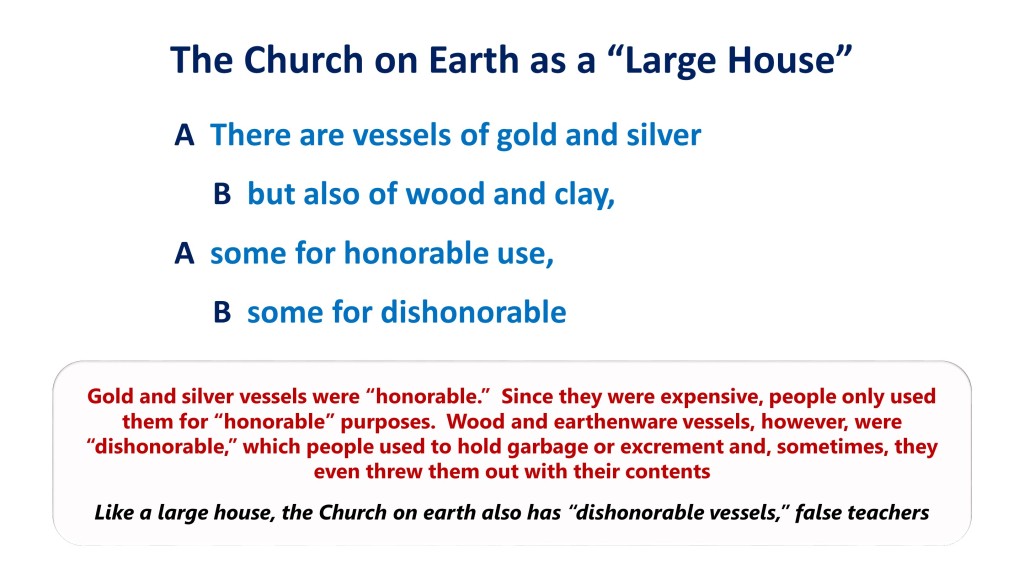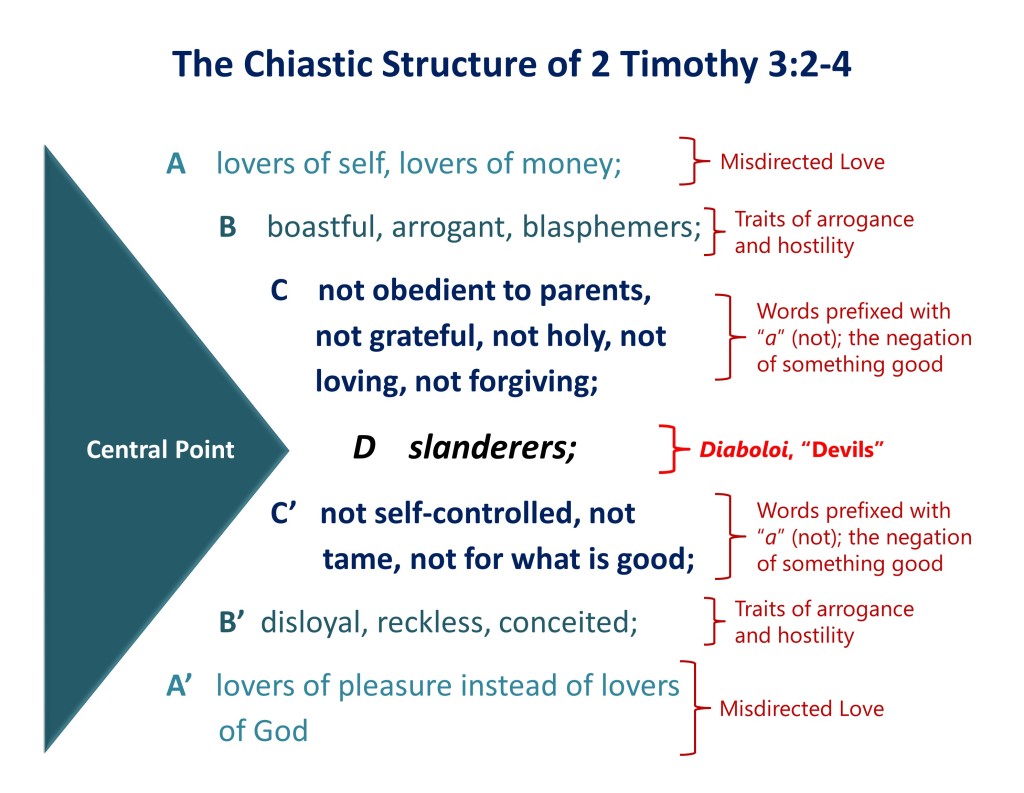 Describing the Church, which Paul called a “foundation,” he now moves on to what is built on the foundation, the “house.”
Describing the Church, which Paul called a “foundation,” he now moves on to what is built on the foundation, the “house.”
Pastor Timothy, Avoid Needless Quarrels
Read 2 Timothy 2:20
Read 2 Timothy 2:21
Paul now moves from the greater to the lesser. Like the Church is to be free from falsehood, so is the individual Christian.
- How does the Christian cleanse himself from what is dishonorable?
- After no longer dishonorable but honorable, in what three ways is the Christian now useful?
More Specific Instructions to Timothy as a Pastor
The context of this section is to receive, preserve, and pass on the content of the Faith that Jesus gave to His Apostles, which Timothy had received. However, some at Ephesus were teaching something different, something new that wasn’t part of the “deposit of the Faith.”
Read 2 Timothy 2:22
- What two actions are Pastor Timothy (and/or all pastors in the Church) to do?
“youthful passions”: Greek, neoterikas epithumia. The most common meaning of neoterikas pertains to being young. But that is not the only meaning. It can also mean something that is new or an innovation (Isocrates, Letter 7:9; Josephus, Against Apion 1:28, Antiquities 16:399). This section deals with those who are promoting something new, not Timothy and his “youthful passions.”
Paul furthers confirm this understanding of neoterikas.
Read 2 Timothy 2:23
“Have nothing to do with”: Greek, paraitesomai. Paul uses the imperative voice (command). Here, Paul is commanding Timothy to refuse “foolish, ignorant controversies.”
“foolish, ignorant”: Greek, moros, foolishness based on ignorance. Greek, apaideutos, uneducated, uninstructed. Paul also described these false teachers in 1 Timothy 1:7. “They do not know what they are talking about, matters about which they make confident assertions.”
- Why must Timothy not get caught up in those ignorant, uneducated controversies?
- What does this imply about needing to be educated on the content of the Faith?
Paul will now speak to this need for people in the Church to know on the content of the Faith.
Read 2 Timothy 2:24-25a
“servant”: Greek, doulos, which is the word for “slave.”
- In context of this passage, who is the Lord’s slave?
- In what four ways is Timothy, the “Lord’s slave,” to correct the negative impact of these “ignorant, uneducated” false teachers on the congregation at Ephesus?
- Discuss the tension between refusing to get caught up in quarrels about “ignorant, uneducated controversies” and yet still “correcting his opponents with gentleness”?
Read 2 Timothy 2:25b-26
- What is the goal of “patiently enduring evil” and “correcting his opponents with gentleness”?
- Scripture commands us to repent. When someone repents, he does turn away from sin toward Christ. And yet, who brings about this repentance? Discuss.
- If the devil captured these “ignorant, uneducated” false teachers “to do his will,” how then does knowing the content of the Faith help prevent you from getting caught “in the snare of the devil”?
Difficulties in the Last Days
Read 2 Timothy 3:1-4
- If Timothy was dealing with difficulties in the last days, what does that say about the times we are living in?
- Is this list exhaustive of the sins present in the “last days”?
Paul uses a chiasm to list characteristics of sinful people in “the last days.”
What does this mean?
Paul earlier mentioned false teachers who “were in the snare of the devil… captured by him to do his will” (2 Timothy 2:26). Through “word play,” Paul brings out that those whom he describes are “devils”—human manifestations of those whom the Devil has captured and entrapped. “Devils” is the center point of the chiasm, which means that “devils” drive the rest of the chiasm. Thus, such people are not “devils” because of what they do; they do what they do because they are “devils,” those whom the Devil has entrapped.
Read 2 Timothy 3:5
Paul now describes what these “devils” look like who are part of the Church Militant.
- What do these “devils” look like on the outside?
“denying its power”: This is a participle in the Greek: They are denying, which means they are remaining in a state of unbelief.
- 2 Timothy 2:25 says, “God may perhaps grant them repentance.” 2 Timothy 3:5 says that they “are denying.”
- Who’s responsible for repentance?
- Who’s responsible for unbelief?
- Discuss the tension between Paul telling Timothy to “avoid such people” but also to correct them in gentleness (2 Timothy 2:25)?
Read 2 Timothy 3:6-7
With Timothy as pastor at Ephesus, the false teachers were not able to preach and teach their false doctrine officially within the congregation. Thus, they adapted.
- What tactic did these false teachers use to spread their falsehoods?
- Because their teachings did not originate from the giver of the Church’s doctrine in the New Covenant, Jesus, what are they unable to do? (vs. 7)
Read 2 Timothy 3:8-9
Excursus: Who are Jannes and Jambres?
Jannes and Jambres were Egyptian magicians who opposed Moses and Aaron (Exodus 7:11, 22; 8:7). Although the Old Testament doesn’t name them, we do find them mentioned in the Dead Sea Scrolls, the Damascus Document, Targum Pseudo-Jonathan, and in Jannes and Jambres.
We also find Jannes and Jambres named in non-Semitic writings, such as Pliny’s Natural History and Apology by Apuleius, a Latin-language writer (124 – 170 AD). That Paul mentions them by name to Timothy shows that they both knew the story of Jannes and Jambres.
Why does this matter? Paul compares the false teachers in Ephesus with Jannes and Jambres. So, learning of these two men could help us understand Paul’s point more thoroughly.
Church father, Origen (184 – 253 AD), wrote in his Matthew commentary: “The statement ‘As Jannes and Jambres withstood Moses’ is not based on canonical books but on an apocryphal one entitled Jannes and Jambres.” Today, we only four manuscripts that contain fragments of Jannes and Jambres, the most complete being “Papyrus Chester Beatty XVI.” Here is what we can piece together.
Jannes and Jambres were magicians in Pharaoh’s court. While Jannes was speaking to some friends about marriage and wedding celebrations, messengers from Pharaoh summoned him to oppose “Moses, the Hebrew” and his brother, who were doing astounding feats.
Jannes arrived at the palace and, at first, could match some of Moses’ feats. But Jannes sent word to Pharaoh that divine power was active in Moses. However, that just hardened Pharaoh’s resolve in his stand against Moses.[1]
The Damascus Document (CD 5:19) has Jannes and Jambres, not simply as “sinners,” but as seducers, leading people into sin. Through them, “Belial [the “worthless one,” a name for the Devil] caused Israel to sin for the first time.”[2]
———-
- Paul compares the false teachers in Ephesus with pagan magicians. What does that say about the content of what those false teachers were asserting was Christianity?
- What will eventually happen to such false teachers? (Exodus 8:18-19, 9:11) When?
[1] See The Apocryphon of Jannes and Jambres the Magicians by Albert Pietersma, Brill Academic Publications, 1997.
[2] Armin Lange, “The Essene Position on Magic and Divination,” from Legal Texts and Legal Issues: Proceedings of the Second Meeting of the International Organization for Qumran Studies Cambridge 1995, pg. 418




